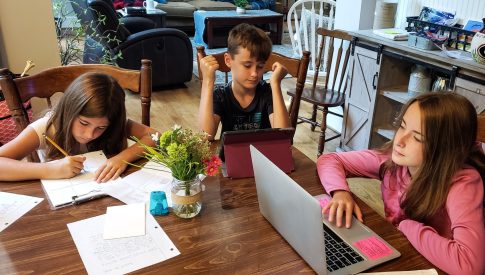English - S1/S2 Index
Online Lessons for Students in Scotland learning S1/S2 English
- Studying Texts
- Close Reading (RUAE)
- Responding to Texts
- Extended Writing
- Language and Grammar
- Vocabulary
- Solo Talk
- Group Discussion
Our lessons will help you to deepen your analytical and writing skills.
Poetry helps in understanding different perspectives. Learning from poetry can help you respect and understand the viewpoints of people across the globe. In this lesson understand the structure and language of poems.
In this lesson understand the features of prose-fiction texts like novels and short stories. Develop your ability to discuss and describe these features.
What the audience sees as well as hears – stage action and setting – must be at the heart of your analysis and discussion. In this lesson understand the features of drama texts. Develop your ability to discuss and describe these features.
‘Film language’ describes the way film ‘speaks’ to its audiences and spectators. Directors, producers and editors work to create meaning from themoving images of film, video and television. In this lesson understand the features of film text. Develop your ability to describe these features.
Structuring your answers and understanding marking can help you get the best result for your English close reading exams.
In this lesson understand close reading tasks. Learn to identify ‘understanding questions’, questions to ask you to answer ‘in your own words’ and ‘context’ questions.
Imagery is a type of figurative language that gives the reader an imaginative visual. Word choice refers to a writer’s selection of words that mainly affects the mood of the story. In this lesson understand close-reading tasks. To identify ‘analysis questions’ and questions that ask you to discuss word choice and imagery.
In this lesson develop your understanding of close reading tasks. Learn to identify ‘analysis questions’ that ask you to discuss sentence structure and punctuation.
Evaluation is about making a critical judgement. In this lesson develop your understanding of close-reading tasks. Learn to identify ‘evaluation questions’ and questions that ask you to discuss the effectiveness of the writer’s language and ideas.
A critical essay is a form of academic writing that analyses, interprets, and/or evaluates a text. In this lesson learn the structure of a critical essay. Identify important information from the texts you have studied. Develop your ability to explain your ideas.
In this lesson understand the importance of reading. Develop strategies that help you read new texts independently.
Learn the best techniques for writing a piece of fiction. In this lesson revise the main features and structure of short stories. Develop your ability to write imaginatively and descriptively.
A personal essay is a piece of writing that serves to describe an important lesson gathered from a writer’s life experiences. In this lesson understand the main features and the structure of personal-essay writing. Develop your ability to write descriptively and explore your own feelings.
Poetry is a type of literature that conveys a thought, describes a scene or tells a story in a concentrated, lyrical arrangement of words. In this lesson revise the structure of poems, including lines and stanzas. Revise poetic techniques and understand how to use them.
Learn how different literary techniques can be used to change the effectiveness of your writing. In this lesson revise a range of different persuasive-language techniques. Understand what makes these techniques, and when they can be used in your own writing.
In a discursive piece you are expected to discuss a given topic and present an argument related to it. In this lesson develop your ability to plan and research a piece of discursive writing. Understand the structure of a discursive essay.
Phrases and clauses are the building blocks of sentences. In this lesson learn to revise and consolidate your knowledge of grammar and punctuation. Understand the purpose and structure of a sentence.
A prefix is a word part added to the beginning of a word that changes the word’s meaning. A suffix is a word part added to the end of a word that changes the word’s meaning. In this lesson understand the structure of words and the purpose of prefixes and suffixes.
In this lesson develop your understanding of parts of speech. Understand the purpose of nouns and pronouns.
In this lesson develop your understanding of parts of speech and understand the purpose of verbs and adverbs.
In this lesson develop your understanding of words and understand the purpose of adjectives, comparatives and superlatives in writing.
In this lesson develop your vocabulary and understanding of words. Understand the use of synonyms and antonyms
In this lesson learn the structure of a solo talk. Develop your ability to construct an interesting and engaging presentation.
In this lesson learn the importance of non-verbal communication. Understand what makes a clear and confident spoken performance


"It's bright and colourful, easy to read, and extremely easy to use unlike most textbooks or online learning websites" Daisy, S3 PupilSign Up & Learn Today

